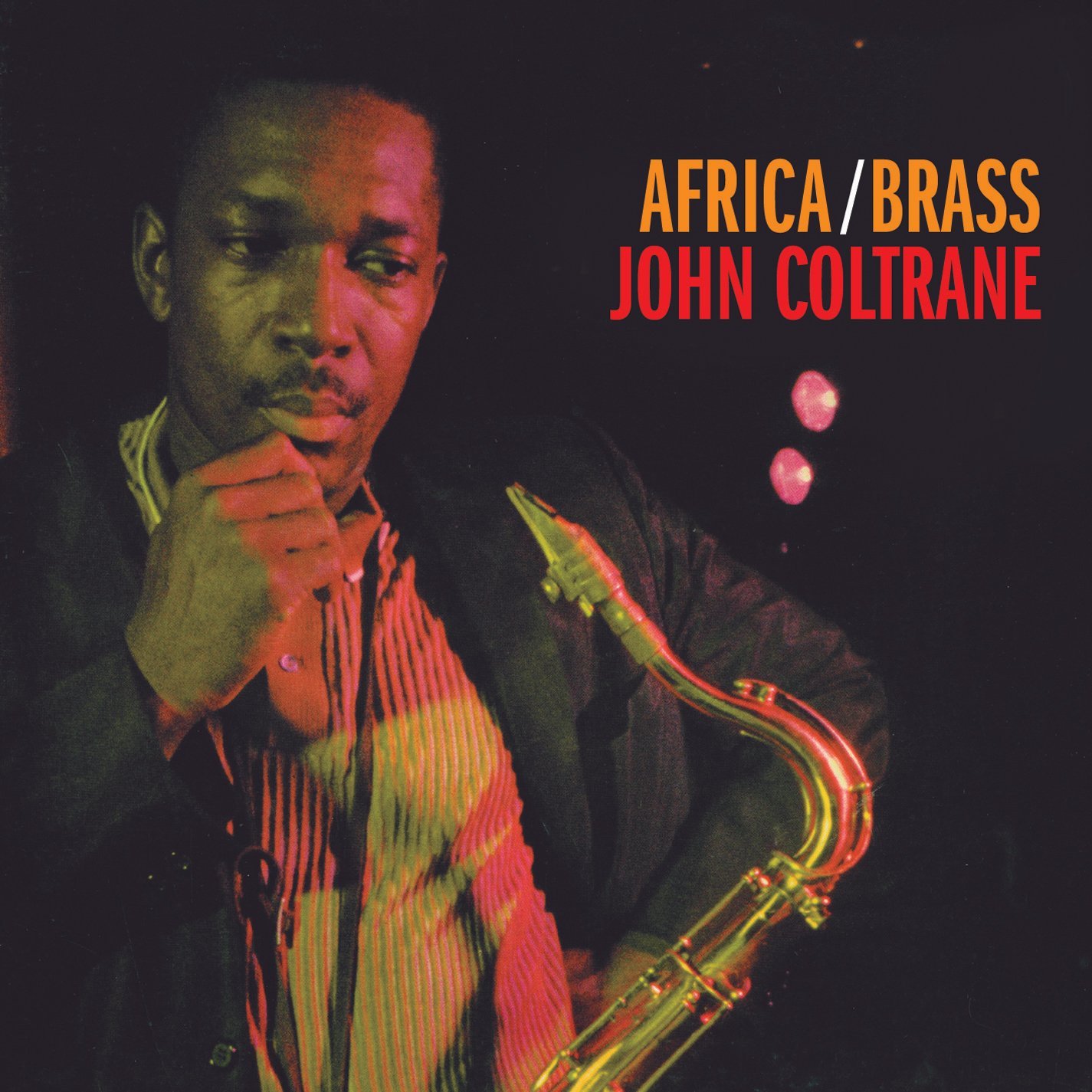John Coltrane is a quiet, powerfully built young man who plays tenor saxophone quite unlike anyone in all of jazz. His style has been described as "sheets of sound” or as “flurries of melody.” But, despite the accuracy, or lack of accuracy of such descriptions, it is a fact that Coltrane’s style is wholly original and of growing influence among new tenor players. —From the liner notes of the album
Africa/Brass, by Dom Cerulli
John William Coltrane was born in Hamlet, NC on Sept. 23, 1926. He would go on to become one of the most important musicians the world has ever known. The indelible mark he left on music cannot be measured, in my opinion. His impact goes beyond music and into faith. Coltrane was made a patron saint by the
African Orthodox Church in San Francisco.
[embed]https://vimeo.com/18068722[/embed]
As Coltrane evolved as a musician, his music became more spiritual, worldly and ethereal. He wanted to know more about the world and he infused this into his music. He studied ideologies and philosophy from India and the Far East. He even named his son Ravi after Ravi Shankar.
After kicking a substance dependency problem in 1957, he became even more spiritual and determined to live a fuller life. In the liner notes of his groundbreaking 1964 record
A Love Supreme, Coltrane mentions the awakening he had in 1957 and says "I experienced, by the grace of God, a spiritual awakening which was to lead me to a richer, fuller, more productive life. At that time, in gratitude, I humbly asked to be given the means and privilege to make others happy through music."
Part of Coltrane's evolution was his embracing the world and becoming a global citizen through deeper knowledge of the spiritual and cultural traditions of the world, and that included Africa and the African diaspora. Around this time period (late '50s), Nigerian Yoruba percussionist and civil rights activist Babatunde Olatunji was gaining a following from jazz musicians. He befriended and recorded with many them. His
Drums of Passion LP was an instant classic and garnered him an even bigger audience. Most notably, Olatunji recorded the fiery, subversive album
We Insist! Freedom Now Suite with Max Roach and Abbey Lincoln, which brought Olatunji even more attention from jazz musicians.
[embed]https://www.youtube.com/watch?v=4fMH_hw8gcs[/embed]
One of the musicians Olatunji befriended during this time was John Coltrane. They never officially recorded together, but they remained close until Coltrane passed away in 1967. Coltrane helped Olatunji open up an African cultural center in Harlem. Coltrane even composed a song called "Tunji" in his honor. The last live recording of a Coltrane performance before he died happened to be at the Olatunji Center of African Culture.
Below are some of the songs that Coltrane either composed or played on that were inspired by Africa and the African diaspora.
Airegin (with the Miles Davis Quintet)
Airegin is Nigeria spelled backwards. It was composed by the legendary saxophonist Sonny Rollins in 1954, but the version below with the Miles Davis Quintet which included John Coltrane was recorded in 1956 for their
Cookin' with the Miles Davis Quintet record.
[embed]https://www.youtube.com/watch?v=qREjajATIzk[/embed]
Liberia
As you can guess, "Liberia" is a song dedicated to the country of Liberia. It was recorded in 1960.
[embed]https://www.youtube.com/watch?v=RgL88el-UbQ[/embed]
Tunji
"Tunji" is a song Coltrane wrote for his close friend, Nigerian Yoruba percussionist Babatunde Olatunji. It was recorded in 1962.
[embed]https://www.youtube.com/watch?v=v26KJNm_nnQ[/embed]
Africa
This is a song dedicated to Africa. It was recorded in 1961.
[embed]https://www.youtube.com/watch?v=NI3WwoBOR_s[/embed]
Dahomey Dance
"Dahomey Dance" was Coltrane's ode to the Kingdom of Dahomey, now known as the Republic of Benin, in West Africa. Benin borders Nigeria to the east, and prior to European slave trade and colonization, the southeast region of Dahomey paid tribute to the vast Yoruba Oyo empire. Dahomey produced a staggering amount of architecture, art, literature, dance, music and religion, most notably Vodun. "Dahomey Dance" was recorded in 1961.
[embed]https://www.youtube.com/watch?v=CADclq82tlY[/embed]
Dakar
Dakar was not a Coltrane album originally. It was recorded in 1957 for Prestige Records and was credited to the group collectively known as the Prestige All Stars. Looking to seize opportunity on Coltrane’s rising popularity, Prestige wisely re-released it under Coltrane’s name in 1963. The song "Dakar," named after the capital of Senegal, was composed by vibraphonist Teddy Charles.
[embed]https://www.youtube.com/watch?v=XWYnfiSvjSk[/embed]
Ogunde
"Ogunde" is a Coltrane composition dedicated to the Yoruba orisha Ogun, the god of iron and metal, and of war. "Ogunde" was recorded in March 1967, a few months before Trane's death.
[embed]https://www.youtube.com/watch?v=tLiheGJ0U-A[/embed]
Tanganyika Strut
Tanganyika Strut is a co-led album by trumpeter Wilbur Harden and Coltrane, but it often has Coltrane as the sole leader on later reissues because record labels wanted to capitalize on Coltrane's fame. Tanganyika was a sovereign East African state that later became Tanzania. Tanganyika Strut was recorded in 1958.
[embed]https://www.youtube.com/watch?v=M-OqF8-N-Dw[/embed]
Gold Coast
Gold Coast was the British colonial name for present day Ghana, and the song title is taken from that.
[embed]https://www.youtube.com/watch?v=JSfeuWs-eZ4[/embed]
Dial Africa
"Dial Africa," like "Tanganyika Strut" and "Gold Coast" are all tunes from sessions Coltrane did with trumpeter Wilbur Harden in 1958.
[embed]https://www.youtube.com/watch?v=uklwwBRXwdM[/embed]
Bahia
Bahia is a state in Brazil. Most of the slaves captured from West Africa by Europeans were sent to Brazil; almost 40 percent of them. Many of them were processed through Bahia. Culturally, Bahia still retains an amalgamation of many African cultures and traditions; from music, to deities, to food and martial arts like capoeira.
The city of Salvador in Bahia has the highest percentage of Afro-Brazilians in all of Brazil. Most of the people in Salvador have African ancestry, and to be more precise, many of them have Yoruba ancestry. Yorubas are one of the major ethnic groups in present-day Nigeria and Benin. The song was Coltrane's ode to the Brazilian state, and it was recorded in 1958.
[embed]https://www.youtube.com/watch?v=4nnhBKz7IP4[/embed]
Brazilia
"Brazilia" is another tune Coltrane dedicated to Brazil. Brasilia is the capital of Brazil, and the song was recorded in 1965.
[embed]https://www.youtube.com/watch?v=055TdYe27mM[/embed]








